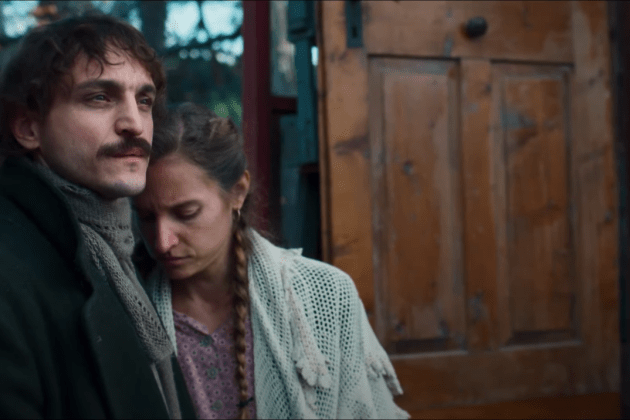‘Lubo’ Review: Riveting Performance From Franz Rogowski Anchors Tale Of Dislocation And Deception – Venice Film Festival
- Oops!Something went wrong.Please try again later.
- Oops!Something went wrong.Please try again later.

Clean, green Switzerland, land of chocolate, cuckoo clocks and direct democracy, is revealed to have a history of racial abuse as ugly as any other in Giorgio Diritti’s rolling epic Lubo, showing in competition at the Venice Film Festival. German actor Franz Rogowski plays the title character, a street performer and paterfamilias who is part of Switzerland’s community of Jenisch, a nomadic people originating in Germany. Lubo’s story is a dramatically terrible one – his wife is killed in a spat with heavy-handed police and his children are taken away, all while he is being marched off to serve time in the army – but it speaks to the truth.
Nobody knows exactly how many Jenisch children were taken from their families by Swiss authorities, but the current estimate is 2000. Lubo opens during the Second World War. Between the 1930s and 1973, when the practice was officially dropped, these children – classified as living on the street – were institutionalised or adopted out, often to farmers who abused them as cheap labor. The purpose, openly acknowledged, was deracination. Nomads disrupted the orderly nature of Swiss society. The only way to get rid of them was to break up their family structures.
More from Deadline
It is still hard to conceive that such cruelty could be effectively buried in box files of the kind we see Lubo search, whenever he has the opportunity, over the decades that follow his personal apocalypse. By that time, he has taken on a new identity: He is Bruno Reiter, an Austrian dealer in jewelry and precious fabrics, an identity he has stolen – along with the jewelry – deep in the mountains while helping the original Bruno Reiter with a smuggling run. By that time, Lubo had become a murderer.
According to the film’s press notes, Diritti shot in 100 locations, with 100 actors in small roles and 1300 extras selected from the appropriate areas: In short, it was a giant undertaking. From the very beginning, when Lubo is performing with other members of his family in a village square lined with Hansel-and-Gretel cottages, there are innumerable opportunities for Diritti and his cinematographer Benjamin Maier to exploit the chocolate-box gorgeousness of the Swiss landscape: icy peaks, whispering woods, sapphire lakes. Even grim scenes, like the frozen ridge where Lubo serves as a sentry during his brief period as an army conscript, leave an impression not so much of tough privation as the wafting fog and soaring spirits of German Nazarene paintings.
We need this outdoor eye candy over three hours Diritti takes for his epic, because it is otherwise largely a journey between plush but gloomy period interiors. Having taken on Reiter’s identity, Lubo travels between the best hotels, his gentlemanly status announced by the stolen car he drives, the fur collars on his coats and the suave manners he has mastered almost overnight; he seduces rich women and fleeces their husbands. One of those husbands, Lubo/Reiter’s banker, tells his secretly besotted wife that her new friend has enough money in his new account to live well for the rest of his life.
Meanwhile, he searches schools and orphanages as the years flash up on the screen. It seems hopeless. His children, who were not even school-age when they were confiscated, are aging somewhere else, becoming unrecognizable, untraceable. There is some prospect of a new family life when he meets Margharita (Valentina Belle), an Italian maid in one of his fancy hotels; she is poor and misplaced like he was, with a boy of her own to raise. Fate seems to be offering him a chance of happiness, but fate has always been against him.
Rogowski’s fey, diffident manner puts a new and convincing spin on the great pretender who can melt any woman’s heart, while his light-footed agility – he started his career as a street clown – becomes Lubo’s own. Working from a script he wrote with Fredo Valla, Diritti seems sometimes in a rush – such as the final run through a police investigation, where the paperwork Lubo has sought for years suddenly materializes and a pedophile predator is thrown into the mix, in order to wrap it all up – and slowing down almost to a stop in scenes he presumably wants to give a particular weight.
It is a quick-quick-slow step that would make the film feel unwieldy if it were not for Rogowski’s binding performance; he is at the center of every scene, but the ripple of feeling – and pretended feeling – across his face never grows dull. The other actors, all well cast, spin around him like planets in orbit, but the narrative is running along a single track: what Lubo will do next. We keep asking that question until the end but, as is so often true, it is the story behind the story that is most compelling.
Title: Lubo
Festival: Venice Film Festival (Competition)
Director: Giorgio Diritti
Cast: Franz Rogowski, Christophe Sermet, Valentina Bellè, Noemi Besedes, Cecilia Steiner, Joel Basman
Running time: 3 hr 1 min
Sales agent: True Colours Glorious Films Srl
Best of Deadline
Venice Film Festival 2023 Photos: The Red Carpet Premieres & Closing Ceremony Winners
SAG-AFTRA Interim Agreements: Full List Of Movies And TV Series
2023 Premiere Dates For New & Returning Series On Broadcast, Cable & Streaming
Sign up for Deadline's Newsletter. For the latest news, follow us on Facebook, Twitter, and Instagram.

